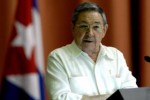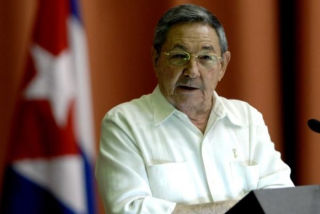 President Raul Castro’s denunciations on US attempts to destabilize Cuba were corroborated through the revelation of a plan to push Cuban youth toward counter-revolution, with participation of a U.S. government agency.
President Raul Castro’s denunciations on US attempts to destabilize Cuba were corroborated through the revelation of a plan to push Cuban youth toward counter-revolution, with participation of a U.S. government agency.
To undermine Cuban authorities, Washington planned the creation of a “Cuban Twitter,” promoted by USAID (U.S. Agency for International Development), through a network of secretly organized front companies with financing routed through offshore banks.
The Associated Press (AP) said today that it had access to more than a thousand documents regarding the Zunzuneo communications network, designed to gain popularity among young Cubans and later “push them toward dissidence.”
The AP said that the network’s users never knew that the project was created by a U.S. agency working with the State Department, nor that the U.S. contractors were gathering personal data about them in the hope that the information could be used for political purposes.
On January 1 of this year, on the occasion of the 55th anniversary of the Cuban Revolution, President Raul Castro denounced “attempts to subtly introduce platforms for neoliberal thought and restoration of neo-colonial capitalism” in Cuba.
“They are eager to deceptively market the supposed advantages of disregard for ideology or social conscience to the youngest (Cubans), as if such concepts were not fully reflective of ruling class interests in the capitalist world,” said the Head of State in Santiago de Cuba, in eastern Cuba.
Furthermore, he emphasized, such efforts were meant to “induce a break between the historical leadership of the Revolution and the new generations, promoting uncertainty and pessimism about future prospects, all with the marked objective of dismantling socialism in Cuba from within.”
According to the AP report, the anti-Cuban plan may have violated U.S. law, which requires written presidential authorization and notification of Congress in order to carry out any secret operation. At the very least, the evidence would seem to contradict the arguments long advanced by USAID about its non-participation in covert actions.
The matter is closely related to the situation of USAID contractor Alan Gross, arrested in Cuba in 2009 and convicted of engaging in illegal actions with objectives and procedures very similar to those of the Zunzuneo operation.
The report emphasizes that USAID and its contractors made a significant effort to conceal the project’s ties with Washington. To this end, front companies were established in Spain and bank accounts in the Cayman Islands, to cover the money trail.
Attempts were also made to hire business executives without revealing to them that the project was being financed by the U.S. government.
“There will be absolutely no mention of United States government involvement,” said a memo from Mobile Accord, one of the businesses contracted for the project. “This is absolutely crucial for the long-term success of the service and to ensure the success of the Mission,” it added.
Democratic Senator Patrick Leahy from Vermont, chairman of the Senate sub-committee overseeing the State Department and Foreign Operations, said that the revelations were troubling.
“There is the risk to young, unsuspecting Cuban cellphone users who had no idea this was a U.S. government-funded activity,” he pointed out. Also, “there is the clandestine nature of the program that was not disclosed to the appropriations subcommittee with oversight responsibility. And there is the disturbing fact that it apparently activated shortly after Alan Gross, a USAID subcontractor who was sent to Cuba to help provide citizens access to the Internet, was arrested.”
The plan, which was meant to mobilize and organize young Cubans to oppose their country’s government lasted from 2009 to 2012, said the AP.
Zunzuneo is yet another in a long list of secret anti-Cuban operations, running from the Bay of Pigs, through the hundreds of attempts to assassinate Fidel Castro and other Cuban leaders, and support for other counter-revolutionary gangs who murdered rural residents and teachers.
That list includes terrorist actions such as the blowing up of the Cubana de Aviacion passenger plan in 1976, with 73 people on board, and the introduction to Cuba of illnesses such as hemorraghic dengue and other biowarfare agents.
The U.S. government also finances and directs radio and television broadcasts against Cuba, which has been subjected to the longest economic, financial and commercial blockade in the history of the world.
 Escambray ENGLISH EDITION
Escambray ENGLISH EDITION





What’s Happening i’m new to this, I stumbled upon this I have discovered It positively helpful and it has aided me out loads. I hope to contribute & help other users like its helped me. Good job. aecdakcdaeddeeeg